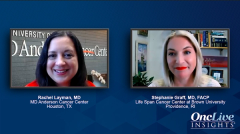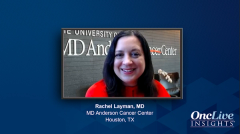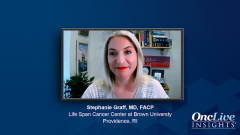
What is on the Horizon for Adjuvant Therapy in Early-Stage Breast Cancer?
Expert medical oncologists take a step into the future and discuss developments within the adjuvant setting of early-stage breast cancer they are most excited about.
Episodes in this series

Transcript:
Rachel Layman, MD: This has been a great conversation. I was curious, what up-and-coming things are you looking forward to in the adjuvant setting?
Stephanie Graff, MD, FACP: In the adjuvant setting, I am excited about some of the trials that are going on that are going to be looking at questions around triple-negative breast cancer. I guess I can say that I kind of hate KEYNOTE 522 [NCT03036488]; it’s a lot of chemotherapy. It’s a very hard treatment to put patients through, and we have trials like OptimICE-PCR [NCT05812807], looking at eliminating the year of adjuvant therapy for patients who have a pathologic complete response. Trials are looking at antibody-drug conjugates, in a KATHERINE-like [NCT01772472] approach for patients who don’t have a pathologic complete response, because honestly, patients who do not have a pathologic complete response after that much treatment worry me a lot. Then importantly, there are some antibody-drug conjugate trials going on in the neoadjuvant space looking to eliminate some of those chemotherapeutics in that 4-drug chemotherapy backbone of KEYNOTE 522, which I think would be a meaningful way to minimize toxicity and streamline that complicated, hard neoadjuvant therapy for patients. I think that’s the next thing on the horizon for early-stage breast cancer that I’m looking forward to. What about you?
Rachel Layman, MD: I agree, and along the theme, I think we’re going to be able to de-escalate therapy for patients who don’t need it and escalate therapy for patients who do. Signatera circulating tumor DNA [ctDNA] testing has been approved by Medicare, although we’re not doing that as the standard of care at our institution yet. I think that although it increases the risk of a recurrence by having a positive test, we don’t really know what to do with that. I am looking forward to some trials that may incorporate the [ctDNA] in which perhaps if someone has a positive test, then you might want to switch therapy or escalate therapy, and if someone has a negative test, maybe you can de-escalate therapy in some of these patients. I think it’s a really exciting time, and I think we’ll be able to optimize therapy a little bit better to give just the right amount to patients.
Stephanie Graff, MD, FACP: I’m hopeful that we get to a place where we can use the tools at our disposal smarter for the best care of the patients who we’re lucky to have in our clinics.
Rachel Layman, MD: Very good. Do you have any closing thoughts?
Stephanie Graff, MD, FACP: No. I’m thankful for everybody who joined us today, and I’m glad that I got to do this with you. Thanks, everyone, for being here with Dr Layman and me for this OncLive® My Treatment Approachprogram, and I hope you found this program useful and valuable for the management of your patients with hormone receptor-positive early breast cancer. Dr Layman and I really enjoyed this discussion, and we will see you next time. Thanks.
Rachel Layman, MD: Thank you.
Transcript edited for clarity.






































